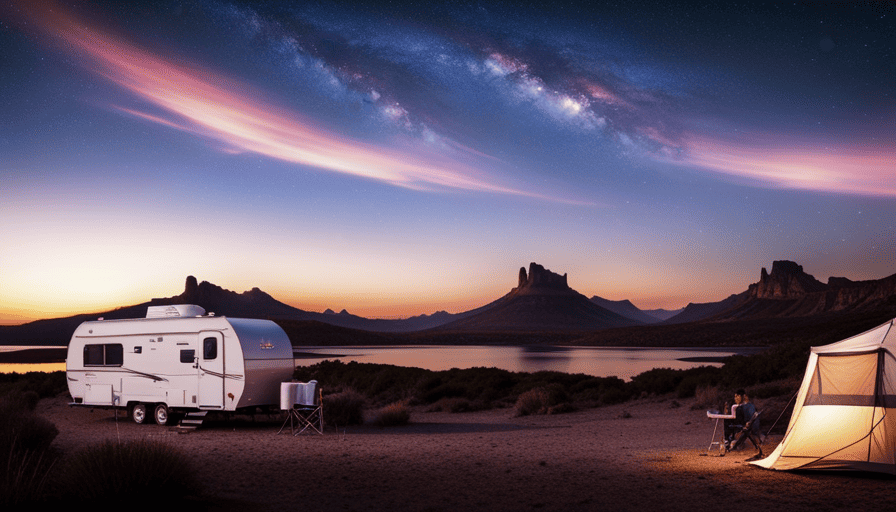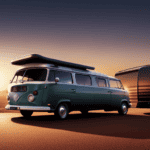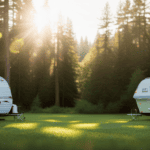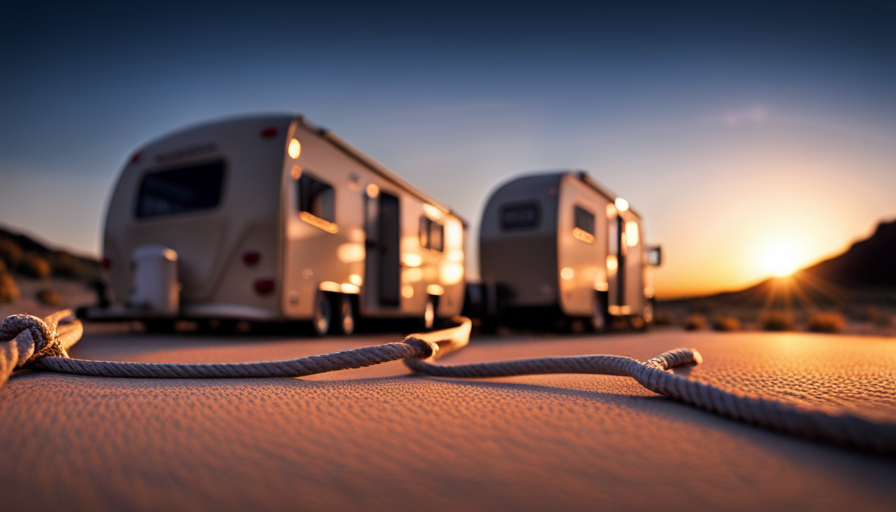Regarding camping, comfort is paramount. For numerous campers, this implies the necessity of a dependable air conditioning (AC) unit in their camper. However, one might wonder about the power usage of such a unit. Specifically, how many amps does an AC unit in a camper consume?
Well, let me give you an example to help you visualize it. Imagine you’re camping in a hot summer day, with the sun beating down on your camper. You turn on your AC unit to cool down the interior and escape the heat. As the AC unit kicks into gear, it draws a certain amount of electrical current, measured in amps, to operate.
In this article, we will delve into the world of camper AC units and explore their power consumption. We will discuss the average amperage of camper AC units, the factors that affect their power consumption, and even provide real-life examples and case studies. Additionally, we will examine the amp usage of different camper AC models and share power management strategies from experienced campers.
So, if you want to ensure a comfortable camping experience, join me as we explore how many amps a camper AC uses and how you can make the most of your power supply.
Key Takeaways
- Camper AC units can consume a significant amount of power, with an average amperage ranging from 10 to 15 amps.
- The amperage of a camper AC unit depends on its BTU rating, but other factors such as efficiency and insulation can also affect power consumption.
- Choosing the right size and an energy-efficient AC unit is important to minimize power consumption.
- Proper insulation is crucial for energy efficiency and comfort, as it reduces reliance on AC units by minimizing heat transfer.
Understanding Amps and Power Consumption
You won’t believe the amount of power a camper AC can consume! When it comes to power consumption, camper AC units can vary significantly depending on their size and efficiency. It’s important to understand amps and power consumption to ensure you have enough electrical capacity to run your AC unit without overloading your system.
To put the power consumption into perspective, let’s compare it to other common household appliances. On average, a camper AC unit can consume anywhere from 10 to 15 amps of power. In comparison, a standard refrigerator typically uses around 6 amps, while a microwave uses around 12 amps. This gives you an idea of just how much power a camper AC unit requires.
To minimize energy usage and maximize efficiency, there are a few energy-saving tips you can follow. Firstly, make sure your camper is properly insulated to prevent cool air from escaping and hot air from entering. Additionally, keep the AC unit’s filters clean to ensure proper airflow. Lastly, consider using a programmable thermostat to regulate the temperature and reduce unnecessary cooling.
Understanding the power consumption comparison and implementing these energy-saving tips can help you make the most out of your camper AC unit. Now, let’s delve into the average amperage of camper AC units.
Average Amperage of Camper AC Units
On hot summer days, camper AC units can be like power-hungry giants, devouring electricity with their insatiable thirst. It is crucial to understand the average amperage of these units to determine the appropriate generator size and prevent power shortages while enjoying a cool breeze inside the camper. The amperage of a camper AC unit depends on its cooling capacity, or BTU rating.
To provide a clearer picture, let’s take a look at a table showcasing the average amperage of common camper AC units:
| BTU Rating | Average Amperage |
|---|---|
| 5,000 | 12-16 Amps |
| 7,000 | 14-18 Amps |
| 10,000 | 15-20 Amps |
| 15,000 | 20-25 Amps |
These estimates can help in determining the appropriate generator size needed to power the AC unit. It is important to note that other factors, such as the efficiency of the unit and insulation of the camper, can affect power consumption as well.
Understanding the average amperage of camper AC units, along with other factors that affect power consumption, allows for a better grasp of the electrical needs when enjoying the comforts of a cool camper. Moving forward, let’s explore the various factors that can impact power consumption in more detail.
Factors that Affect Power Consumption
Consider the factors that impact your power consumption when using a camper AC unit. It’s important to manage your energy usage to maximize the benefits of energy-efficient appliances. Here are two sub-lists that delve deeper into this topic:
-
Environmental Factors:
- Temperature: The higher the outside temperature, the harder the AC unit has to work to cool the interior, resulting in increased power consumption.
- Humidity: Higher humidity levels can make the AC unit work harder to remove moisture from the air, leading to higher energy usage.
-
Appliance Factors:
- Size of AC Unit: Larger units typically require more power to operate, so choosing the right size for your camper can help manage energy usage.
- Efficiency Rating: Look for AC units with high energy efficiency ratings, as they consume less power while providing the same level of cooling.
Managing your energy usage by considering these factors can help reduce your power consumption and save money.
In the next section, we’ll explore the size and efficiency of the AC unit and how they impact power consumption.
Size and Efficiency of the AC Unit
The size and efficiency of the AC unit are like the dynamic duo of power consumption, with the former determining how much energy it guzzles and the latter dictating how effectively it cools.
When it comes to the size of the AC unit, bigger is not always better in terms of energy consumption. A larger unit will require more power to run, potentially leading to higher electricity bills. On the other hand, a smaller unit may struggle to cool the space adequately, leading to longer operating times and increased power usage. It is crucial to find the right size that matches the cooling needs of your camper.
In addition to size, the efficiency of the AC unit plays a significant role in power consumption. Energy-efficient models are designed to cool effectively while using less energy. These models often incorporate advanced technologies such as improved insulation effectiveness and optimized airflow, resulting in reduced power requirements. By choosing an energy-efficient AC unit, you can minimize power consumption without compromising on cooling performance.
Considering both the size and efficiency of the AC unit is essential for finding the right balance between power consumption and cooling effectiveness in your camper. With the proper unit in place, you can maintain a comfortable environment while minimizing energy usage.
Moving forward, let’s delve into another factor that affects power consumption: the temperature setting.
Temperature Setting
You’ll want to find the perfect temperature setting for your AC unit to keep you cool and comfortable in your camper. Temperature control is crucial to ensure that the AC unit operates efficiently and effectively. Setting the temperature too low can result in excessive energy consumption and unnecessary strain on the system. On the other hand, setting it too high may not provide enough cooling power to keep you comfortable.
To optimize your camper’s energy usage and save on electricity costs, consider these energy-saving tips for temperature control. Firstly, set the thermostat to a moderate temperature, typically around 78°F (25°C). This is a comfortable temperature for most people and strikes a balance between energy efficiency and coolness.
Secondly, use a programmable thermostat to adjust the temperature automatically based on your schedule. This helps to avoid running the AC unit when you’re not in the camper, saving energy.
Lastly, keep the camper well-insulated to prevent cool air from escaping and warm air from seeping in.
Proper temperature control is just one aspect of optimizing your camper’s AC unit. Now, let’s explore the importance of insulation in maintaining a comfortable and energy-efficient environment.
Insulation of the Camper
To ensure a comfortable and energy-efficient environment, insulating your camper is crucial. Proper insulation offers a multitude of benefits, including temperature regulation, noise reduction, and energy conservation.
By minimizing heat transfer, insulation helps keep the interior cool in hot weather and warm in cold weather, reducing the reliance on air conditioning and heating systems. This not only improves comfort but also saves energy and reduces electricity consumption.
There are various insulation materials available for campers, each with its own advantages. Fiberglass insulation is a popular choice due to its affordability and effectiveness in preventing heat transfer. It’s lightweight and easy to install, making it suitable for DIY projects.
Another option is foam insulation, which provides excellent thermal resistance and can be sprayed or injected into cavities for a seamless coverage. Reflective insulation, on the other hand, works by reflecting radiant heat away from the camper, keeping the interior cooler. It’s particularly useful in hot climates.
By insulating your camper, you can create a more comfortable living space while minimizing the need for power-hungry appliances like air conditioning units. This allows for better management of power consumption, leading to lower energy bills and a more sustainable camping experience.
Managing Power Consumption
Maximize your camping experience by effectively managing your power consumption, ensuring a worry-free and eco-friendly adventure. Managing power consumption in your camper is crucial to avoid running out of electricity in the middle of your trip. By reducing electricity usage, you can extend the life of your batteries and save energy. Here are some tips to help you effectively manage power consumption in your camper:
| Tips to Reduce Electricity Usage | Benefits |
|---|---|
| Turn off lights when not in use | Saves battery power and reduces electricity usage |
| Use natural ventilation instead of air conditioning | Minimizes power usage and keeps the camper cool |
| Opt for energy-efficient appliances | Consumes less power and reduces overall electricity usage |
| Insulate your camper properly | Reduces the need for heating or cooling, saving energy |
Implementing these strategies will not only help you preserve battery life but also make your camping experience more sustainable. By managing power consumption and reducing electricity usage, you can enjoy your trip without worrying about running out of power. In the next section, we will explore the importance of using energy-efficient appliances to further enhance your camper’s power efficiency.
Use Energy-efficient Appliances
By choosing appliances that consume less power, your camper becomes more energy-efficient and helps you enjoy an eco-friendly camping experience.
To reduce electricity consumption and make the most of your power supply, consider these energy-saving tips.
First, opt for energy-efficient appliances that are specifically designed for camping. Look for appliances with an Energy Star rating, as they’re known to consume less power while still providing the same level of performance.
Additionally, consider investing in appliances that have built-in power-saving features such as automatic shut-off timers or adjustable temperature settings. These features can help you further reduce power consumption when the appliances aren’t in use or when you only need them at a lower setting.
Furthermore, choose appliances that are appropriately sized for your camping needs. Smaller appliances generally consume less power compared to larger ones.
Finally, remember to unplug appliances when they aren’t in use to prevent any unnecessary power drain.
By implementing these energy-saving tips and reducing electricity consumption, you can ensure that your camper is more energy-efficient. Limiting the use of other high-power appliances will further optimize your power usage and allow you to enjoy a comfortable camping experience without compromising on the essential amenities.
Limit the Use of Other High-power Appliances
One surprising fact is that limiting the use of high-power appliances can significantly reduce your carbon footprint while camping. When camping, it’s essential to be mindful of the amount of power your appliances consume, especially if you’re relying on alternative power sources such as solar panels or generators. By using energy-efficient appliances as discussed in the previous subtopic, you’re already making a positive impact.
However, it’s equally important to limit the use of other high-power appliances to further minimize your energy consumption. To do this, consider only using appliances when necessary and for short durations. For example, instead of leaving the microwave running for a long time, opt for quick heating methods such as a propane stove. Additionally, regular maintenance of your appliances can ensure their optimal performance and prevent any unnecessary energy waste. Troubleshooting any issues promptly can also help avoid overconsumption of power.
By limiting the use of high-power appliances, you not only reduce your carbon footprint but also extend the life of your alternative power sources. This approach allows you to make the most of your available power and enjoy the camping experience without worrying about running out of energy.
Now, let’s explore how you can utilize shade and ventilation to reduce cooling needs.
Utilize Shade and Ventilation to Reduce Cooling Needs
To limit the use of other high-power appliances and reduce the strain on your camper AC, it’s important to utilize shade and ventilation effectively. By doing so, you can lower the cooling needs of your camper and minimize the energy consumption of your AC unit.
Shade plays a crucial role in keeping your camper cool. Parking your camper under a tree or using an awning can significantly reduce the amount of direct sunlight it receives, thereby decreasing the heat buildup inside.
Additionally, proper ventilation is essential to promote air circulation and prevent stagnant hot air. Opening windows, using roof vents, or even installing a fan can help in this regard.
Here are some maintenance and cleaning tips to ensure the optimal performance of your camper AC:
- Regularly clean the AC filters to remove dust and debris that can obstruct airflow.nn2. Inspect and clean the evaporator and condenser coils to enhance heat transfer efficiency.nn3. Check the AC ducts for any leaks or blockages to ensure proper airflow.nn4. Schedule routine professional maintenance to address any potential issues.
By implementing these shade and ventilation benefits and following proper maintenance practices, you can improve the efficiency of your camper AC.
Now, let’s move on to some tips for optimal power usage to further enhance your camping experience.
Tips for Optimal Power Usage
Maximize the efficiency of your air conditioner by implementing these tips for optimal power usage. By utilizing insulating techniques and energy-saving hacks, you can reduce the amount of power your camper AC uses, ultimately extending the life of your batteries and saving on energy costs.
One effective way to optimize power usage is by insulating your camper. Proper insulation helps to maintain a consistent temperature inside, reducing the workload on your AC unit. This can be achieved by sealing any gaps or cracks, adding insulation to windows and doors, and using reflective window coverings to prevent heat from entering.
Another energy-saving hack is to use a programmable thermostat. This allows you to set specific temperature ranges for different times of the day, ensuring that your AC is only running when necessary. Additionally, keeping your AC filters clean and regularly maintaining your unit will improve its efficiency.
To further emphasize these tips, consider the following table:
| Tips for Optimal Power Usage |
|---|
| Insulate your camper |
| Use a programmable thermostat |
| Clean and maintain your AC |
By implementing these strategies, you can significantly reduce the power consumption of your camper AC. This will not only save you money but also increase the lifespan of your batteries. In the next section, we will discuss how to use a generator or shore power for additional power options.
Use a Generator or Shore Power
When it comes to optimizing power usage in your camper, one option to consider is using a generator or shore power.
Both options provide a reliable source of electricity to power your camper’s appliances and systems.
A generator is a portable device that runs on fuel, such as gasoline or propane, and converts it into electricity. It can provide a consistent power supply and is especially useful when camping in remote areas without access to electrical hookups. However, generators can be noisy, require regular refueling, and emit fumes, which may not be ideal for some campers.
On the other hand, shore power refers to connecting your camper to an electrical hookup at a campsite or RV park. This allows you to tap into a stable power source without the need for a generator. Shore power is convenient, reliable, and eliminates the need to carry and maintain a generator. It also ensures a constant supply of power, making it suitable for longer stays at campsites.
Using a generator or shore power are both viable options for powering your camper. While a generator provides flexibility and independence, shore power offers convenience and stability. Consider your camping needs and preferences when deciding which option is best for you.
In the next section, we will explore the benefits of considering solar power options for your camper’s electricity needs.
Consider Solar Power Options
If you’re looking for a sustainable and eco-friendly way to power your camper, solar power options are worth considering. Solar power offers numerous benefits for campers, including reducing reliance on fossil fuels and minimizing environmental impact. Installing solar panels on your camper can provide you with a reliable source of electricity wherever you go.
Here are a few key advantages of using solar power for your camper:
-
Energy Efficiency: Solar panels convert sunlight into electricity efficiently, ensuring that you have a consistent power supply.
-
Cost Savings: While the initial installation cost may be higher, solar power can help you save money in the long run by reducing or eliminating the need for traditional power sources.
-
Independence: With solar power, you can enjoy the freedom of camping off-grid without worrying about finding electrical hookups.
-
Low Maintenance: Solar panels require minimal maintenance, making them a hassle-free option for powering your camper.
When it comes to installing solar power in your camper, it’s important to consider factors such as the size and placement of the panels, as well as the capacity of the battery bank. This ensures optimal efficiency and performance.
Transitioning into the subsequent section about using a power management system, it is essential to have a reliable way to manage and distribute the electricity generated by your solar panels.
Use a Power Management System
When considering solar power options for your camper, it’s important to also think about utilizing a power management system. This system can help you optimize your energy usage and ensure that you have enough power to run your air conditioning unit efficiently.
A power management system allows you to monitor and control the amount of power being used in your camper. It helps you identify which appliances are consuming the most energy, allowing you to make informed decisions on how to save power. By using power saving techniques and investing in energy efficient appliances, you can significantly reduce your overall power usage.
For example, you can choose to replace your old air conditioning unit with a newer, more energy efficient model. These units are designed to cool your camper effectively while consuming less power. Additionally, you can use power management features to set temperature limits and schedules, ensuring that your air conditioning is only running when necessary.
By incorporating a power management system and adopting energy saving practices, you can maximize the efficiency of your air conditioning unit while minimizing power consumption. In the next section, we will explore how to prepare your camper for efficient AC usage without compromising comfort.
Preparing Your Camper for Efficient AC Usage
To optimize your camper’s energy efficiency and ensure a cool oasis on hot days, it’s crucial to prepare your rig for AC usage like a conductor fine-tuning an orchestra. By implementing power-saving techniques and ensuring proper insulation, you can maximize the effectiveness of your camper’s AC system while minimizing energy consumption.
Here are four key steps to prepare your camper for efficient AC usage:
-
Insulate your camper: Proper insulation is essential for maintaining a comfortable temperature inside your camper. Insulating the walls, ceiling, and floor will help prevent heat transfer, keeping the cool air inside and reducing the strain on your AC unit.
-
Seal air leaks: Identify and seal any air leaks in your camper. Leaky windows, doors, and vents can allow hot air to enter and cool air to escape, making your AC work harder than necessary.
-
Use window coverings: Install window coverings such as blinds or curtains to block out the sun’s heat during the hottest parts of the day. This will help maintain a cooler interior temperature and reduce the need for excessive AC usage.
-
Utilize shade: Park your camper in a shaded area whenever possible. This will naturally keep the temperature inside cooler, reducing the workload on your AC system.
By implementing these power-saving techniques and ensuring proper insulation, you can optimize your camper’s energy efficiency and enjoy a comfortable living space. To further enhance your AC system’s performance, it’s important to inspect and maintain your electrical system regularly.
(Transition into the subsequent section: Inspect and maintain your electrical system to ensure uninterrupted AC operation.)
Inspect and Maintain Electrical System
Now that we’ve discussed the steps to prepare your camper for efficient AC usage, let’s delve into the importance of inspecting and maintaining your electrical system. Understanding the electrical capacity of your camper is crucial to ensure that it can handle the power requirements of your AC unit.
By inspecting the electrical system, you can identify any potential issues that may arise and troubleshoot them before they become major problems. Start by checking the main breaker panel and ensure that it’s properly labeled. This will help you identify which circuit is dedicated to the AC unit.
Additionally, inspect the wiring for any signs of wear or damage, and tighten any loose connections. It’s also important to test the voltage and amperage of the AC unit to ensure it falls within the recommended range.
Regular maintenance of your electrical system is equally important. Clean the AC unit’s filters regularly to ensure proper airflow and efficiency. Inspect the power cord for any signs of fraying or damage, and replace if necessary.
By understanding the electrical capacity of your camper and troubleshooting any electrical issues, you can ensure that your AC unit operates efficiently and safely.
In the next section, we’ll discuss how to upgrade the wiring if needed to accommodate higher amperage requirements.
Upgrade Wiring if Needed
If you want to enhance your camping experience and ensure a smooth operation of your air conditioner, consider upgrading the wiring in your camper to accommodate higher power requirements. Upgrading the wiring can offer several benefits, including improved electrical safety and increased efficiency.
Here are three reasons why upgrading your camper’s wiring is a worthwhile investment:
-
Enhanced Performance: Upgrading the wiring allows your air conditioner to receive the necessary power it requires to function optimally. This ensures that you can enjoy a cool and comfortable camping experience even on hot summer days.
-
Electrical Safety: Outdated or inadequate wiring can pose a safety hazard, increasing the risk of electrical fires or other electrical accidents. By upgrading the wiring, you can ensure that your camper’s electrical system is up to code and meets the necessary safety standards, providing peace of mind during your camping trips.
-
Lower Maintenance Costs: Upgrading the wiring reduces the chances of electrical issues and breakdowns, saving you money on repairs and maintenance in the long run.
Upgrading your camper’s wiring may come at an initial cost, but the benefits outweigh the expense. It not only improves the performance of your air conditioner but also enhances electrical safety and reduces maintenance costs.
In the next section, we’ll discuss the importance of using surge protectors and voltage regulators to further safeguard your camper’s electrical system.
Use Surge Protectors and Voltage Regulators
Protect your camper’s electrical system from potential disasters by using surge protectors and voltage regulators, because without them, your precious camping trip could turn into a chaotic and dangerous nightmare. Surge protectors are essential in safeguarding your camper’s electrical devices and appliances from voltage spikes caused by power surges. These devices work by diverting excess voltage away from your equipment, preventing damage and ensuring their longevity. Additionally, surge protectors also provide protection against electrical fires, which can be caused by faulty wiring or overloaded circuits.
Voltage regulators, on the other hand, help to stabilize the voltage levels in your camper’s electrical system. They ensure a consistent and safe flow of electricity, protecting your sensitive electronic devices from damage caused by fluctuations in voltage. Voltage regulators also help to optimize the performance of your appliances and prevent them from overheating. By maintaining a steady voltage, they ensure that your air conditioner, refrigerator, and other power-hungry devices operate efficiently and effectively.
Incorporating surge protectors and voltage regulators into your camper’s electrical system brings numerous benefits, including increased safety, device protection, and improved performance. These devices provide peace of mind, allowing you to enjoy your camping trip without worrying about electrical mishaps. In the next section, we will discuss important safety considerations to keep in mind when using your camper’s electrical system.
Safety Considerations
Using surge protectors and voltage regulators in your camper’s electrical system ensures a consistent and safe flow of electricity, preventing damage to your devices and optimizing their performance. It is important to consider safety measures when using electrical appliances in your camper. Here are some insulation tips to keep in mind:
- Use foam insulation to seal any gaps or cracks in the walls or windows of your camper. This will help to keep the cold air out in the winter and the hot air out in the summer, reducing the strain on your air conditioning unit.
- Insulate the floor of your camper with a layer of insulation board or foam. This will help to keep the temperature inside your camper more stable, reducing the need for excessive heating or cooling.
- Invest in energy-saving appliances for your camper. Look for appliances with a high energy efficiency rating, such as refrigerators, air conditioners, and heaters. These appliances will use less electricity and help to reduce the overall load on your electrical system.
By following these insulation tips and using energy-saving appliances, you can reduce the strain on your camper’s electrical system and ensure that it operates safely and efficiently. It’s important to avoid overloading the electrical system to prevent any potential hazards or damage to your devices.
Avoid Overloading the Electrical System
To ensure the safe and efficient operation of your camper’s electrical system, it’s crucial to be mindful of overloading it, as this can lead to potential hazards and damage to your devices. Did you know that overloading electrical systems is one of the leading causes of electrical fires in recreational vehicles? Implementing power saving techniques and practicing energy conservation can help prevent overloading and ensure the longevity of your camper’s electrical system.
One effective way to conserve energy and avoid overloading the electrical system is to be mindful of the power consumption of your appliances and devices. By using a power rating chart, you can easily determine the amount of power each appliance or device requires. This will help you better distribute the load and prevent exceeding the capacity of your camper’s electrical system.
Additionally, consider implementing power saving techniques such as using LED lights instead of incandescent bulbs, turning off appliances and devices when not in use, and using energy-efficient appliances. These small adjustments can significantly reduce power consumption and minimize the risk of overloading.
By being conscious of your power usage and incorporating energy conservation practices, you can ensure the safe and efficient operation of your camper’s electrical system. In the next section, we will discuss the importance of using proper extension cords and adapters to further enhance the safety of your camper’s electrical setup.
Use Proper Extension Cords and Adapters
Make sure you have the right extension cords and adapters to ensure a safe and efficient electrical setup for your camper. When it comes to extension cord safety, there are a few important factors to consider:
-
Gauge: Choose an extension cord with the appropriate gauge for the power you need. A lower gauge number indicates a thicker wire, which can handle higher amperage without overheating. For air conditioners, which typically draw a significant amount of power, a 12-gauge extension cord is recommended.
-
Length: Keep in mind that longer extension cords can result in voltage drop, reducing the efficiency of your electrical system. Try to use the shortest possible cord that can reach your power source.
-
Outdoor rating: Make sure to use extension cords that are specifically designed for outdoor use. These cords are typically more durable and weather-resistant.
-
Capacity: Check the capacity of your adapters to ensure they can handle the amperage required by your camper’s AC unit.
Proper adapter usage is also crucial for a safe electrical setup. Use adapters that are specifically designed for RVs and campers, as they’re built to handle the unique electrical demands of these vehicles.
Using the right extension cords and adapters is essential for maintaining a safe and efficient electrical setup in your camper. By following these guidelines, you can minimize the risk of electrical issues and ensure a smooth camping experience. Regularly check for signs of electrical issues to stay ahead of any potential problems.
Regularly Check for Signs of Electrical Issues
Regularly checking for signs of electrical issues is essential to ensure the safety and efficiency of your camper’s electrical setup. Inspecting the wiring and troubleshooting any electrical issues can help prevent potential problems and ensure that your camper’s AC unit is functioning properly.
To help you stay organized and keep track of your inspections, I have created a table below outlining key areas to inspect and common signs of electrical issues to look out for:
| Area to Inspect | Common Signs of Electrical Issues |
|---|---|
| Electrical connections | Loose or frayed wires, sparks, or unusual heat |
| Circuit breakers | Frequent tripping or difficulty resetting |
| Power outlets | Burn marks, loose connections, or non-functioning outlets |
| AC unit wiring | damaged insulation, loose connections, or overheating |
| Grounding system | Lack of proper grounding, electrical shocks, or buzzing sounds |
By regularly checking these areas and addressing any issues promptly, you can ensure the safety and efficiency of your camper’s electrical system. This will help prevent potential damage to your AC unit and ensure that you have a comfortable camping experience.
Transitioning to the next section, it’s important to note that while regular maintenance and troubleshooting are important, there may be times when alternative cooling options for campers are necessary.
Alternative Cooling Options for Campers
Transitioning to alternative cooling options, it’s fascinating to note that campers who utilize portable fans experience up to a 30% decrease in indoor temperature. When it comes to camping, finding cost-effective cooling methods is essential. Thankfully, there are alternative energy sources and cooling methods that can help campers beat the heat without draining their power supply or breaking the bank.
One popular alternative energy source for cooling campers is solar power. Solar panels can be installed on the roof of the camper to harness the sun’s energy and power fans or even air conditioning units. This allows campers to stay cool without relying solely on their camper’s electrical system or the use of a generator.
Another cost-effective cooling method for campers is evaporative cooling. This method utilizes water to cool the air, making it a great option for dry climates. Evaporative coolers, also known as swamp coolers, use a fan to blow air over a wet pad, causing the water to evaporate and cool the air in the process.
Transitioning to the subsequent section about portable fans and ventilation systems, it’s important to consider these alternatives to traditional air conditioning when camping. These options provide campers with efficient and effective ways to stay cool while also being mindful of their power usage and budget.
Portable Fans and Ventilation Systems
To enhance your camping experience, consider incorporating portable fans and ventilation systems to keep you cool and comfortable in the great outdoors. These devices not only provide a refreshing breeze but also help circulate the air inside your camper, preventing stagnant and stuffy conditions. Proper ventilation is crucial in maintaining a pleasant environment and reducing the risk of mold and mildew growth.
To highlight the benefits of proper ventilation and portable fan maintenance, let’s take a look at the following table:
| Benefits of Proper Ventilation | Portable Fan Maintenance |
|---|---|
| Reduces condensation buildup | Regularly clean fan blades |
| Prevents mold and mildew growth | Lubricate fan motor if necessary |
| Improves indoor air quality | Check and replace filters |
By ensuring your portable fan is well-maintained and your camper is properly ventilated, you can enjoy a cooler and healthier camping experience. However, if you’re looking for an even more efficient cooling solution, let’s delve into the next section about evaporative coolers.
The information provided above emphasizes the importance of portable fan maintenance and the benefits of proper ventilation. Moving forward, we will explore the topic of evaporative coolers.
Evaporative Coolers
Evaporative coolers are a game-changer when it comes to staying cool during your camping adventures. These portable swamp coolers are designed to provide efficient cooling by using the natural process of evaporation. They work by pulling warm air through a moistened pad, which then evaporates the water and cools the air. This cooled air is then blown into the surrounding area, providing a refreshing breeze.
One of the key benefits of evaporative cooling is its energy efficiency. Unlike traditional air conditioners, which require a significant amount of electricity to operate, evaporative coolers use only a fraction of the power. This makes them ideal for campers who are often limited in their electrical supply.
Another advantage of evaporative coolers is their portability. They are compact and lightweight, making them easy to transport and set up wherever you need them. Whether you’re camping in a tent or a camper van, these coolers can provide relief from the heat without taking up too much space.
Evaporative coolers are a great option for campers looking to beat the heat. Their portable design and energy efficiency make them a practical choice for staying cool in the outdoors. However, if you’re looking for even more powerful cooling, you may want to consider window or portable air conditioners.
Window or Portable Air Conditioners
If you’re looking for a more powerful way to cool down, window or portable air conditioners can provide a refreshing escape from the summer heat during your camping trips. These air conditioners are designed to be installed in a window or easily transported from one location to another. They are ideal for campers who want a convenient and efficient way to cool their living space.
When it comes to window installation, these air conditioners are relatively easy to set up. They typically come with a mounting kit that allows you to securely attach the unit to a window frame. This ensures a tight seal, preventing any hot air from leaking into the room and maximizing the cooling efficiency.
In addition to their ease of installation, window and portable air conditioners are known for their energy efficiency. Many models on the market today are designed to consume less power while still providing effective cooling. This not only helps to save on energy costs but also reduces the strain on your camper’s electrical system.
Now, let’s delve into some real-life examples and case studies to see how campers have benefited from using window or portable air conditioners.
Real-life Examples and Case Studies
Imagine how much more enjoyable your camping experience would be with the cool relief of a window or portable air conditioner. Real-life examples and case studies have shown the effectiveness of these AC units in providing comfort during camping trips.
One such example is a camper who used a portable air conditioner rated at 8,000 BTUs. This unit had an amp usage of 7.5 amps, which was well within the capacity of a standard campground power outlet.
In another case study, a camper opted for a window air conditioner with a higher cooling capacity of 12,000 BTUs. This unit had an amp usage of 10 amps, requiring a slightly higher power supply. However, the camper successfully managed the power usage by utilizing a power management strategy that involved turning off other appliances when the AC was in use.
These real-life examples highlight the importance of understanding the amp usage of different camper AC models and implementing power management strategies. By doing so, campers can enjoy the cool relief of an air conditioner while ensuring they do not overload the campground’s power supply.
In the subsequent section, we will explore the specific amp usage of different camper AC models, providing you with valuable information for your camping adventures.
Amp Usage of Different Camper AC Models
The power requirements for various camper air conditioning models can vary significantly, making it crucial to understand the amp usage of each unit before embarking on your camping adventures.
When it comes to camper air conditioners, the average power consumption can range from 10 to 20 amps. However, it’s important to note that this is just an average, and different models may have different power requirements.
To ensure efficient energy usage and minimize the strain on your camper’s electrical system, there are a few energy-saving tips you can follow. Firstly, consider investing in a camper AC unit that has a higher energy efficiency rating. This will help reduce the amount of power it consumes while still providing effective cooling. Additionally, it’s recommended to keep your camper well-insulated to prevent heat gain and loss, which can increase the workload on your AC unit.
Now that you understand the amp usage of different camper AC models and have some energy-saving tips in mind, it’s time to explore power management strategies from experienced campers. These strategies can help you optimize your power usage and ensure a comfortable camping experience without compromising your electrical system’s capabilities.
Power Management Strategies from Experienced Campers
To optimize your power usage and ensure a comfortable camping experience, experienced campers have some power management strategies that can help you make the most of your electrical system’s capabilities. By implementing these power saving techniques and utilizing energy efficient appliances, you can extend the life of your camper’s battery and minimize the risk of running out of power during your trip.
Here are some power management strategies from experienced campers:
| Power Management Strategies | Benefits |
|---|---|
| Use LED lights | LED lights are more energy efficient and last longer than traditional incandescent bulbs. |
| Utilize solar panels | Solar panels can harness the sun’s energy to power your camper, reducing reliance on batteries. |
| Opt for propane appliances | Propane appliances, such as stoves and refrigerators, consume less power compared to their electric counterparts. |
By incorporating these strategies, you can conserve power and optimize the efficiency of your camper’s electrical system. This will allow you to enjoy a comfortable camping experience without worrying about power limitations.
By implementing power saving techniques and utilizing energy efficient appliances, you can make the most of your camper’s electrical system. This will ensure a comfortable camping experience without the risk of running out of power.
Conclusion and Final Tips for a Comfortable Camping Experience
For a camping experience that is as smooth as a flowing river, remember to implement these power management strategies and follow these final tips.
When it comes to power saving tips, one of the most important things to consider is choosing the right campground. Look for a campground that offers electrical hookups, as this will allow you to power your camper’s AC unit without draining your battery. Additionally, consider the amenities offered by the campground, such as shade trees or access to a nearby river or lake. These natural features can help keep your camper cool, reducing the need for excessive AC usage.
Another power saving tip is to be mindful of your energy usage. Turn off lights and appliances when they’re not in use, and consider using energy-efficient LED bulbs. You can also invest in a solar panel system to supplement your power needs. This won’t just save energy but also help reduce your carbon footprint.
Lastly, make sure to properly insulate your camper to prevent cold or hot air from escaping, as this will reduce the workload on your AC unit.
By implementing power saving tips and choosing the right campground, you can ensure a comfortable and enjoyable camping experience. Remember to be mindful of your energy usage and make use of natural features to reduce the need for excessive AC usage. With these strategies in place, you can relax and enjoy the great outdoors without worrying about power management. Happy camping!
Frequently Asked Questions
How can I limit the use of other high-power appliances in my camper to reduce power consumption?
To reduce power consumption in my camper, I can employ various energy-saving techniques. One effective strategy is to limit the use of other high-power appliances. By doing so, I can minimize the demand on the electrical system and ensure that power is efficiently distributed.
This can be achieved by using low-power alternatives or simply reducing the duration of usage. Additionally, optimizing insulation and sealing any air leaks can help improve energy efficiency in the camper.
What are some tips for optimal power usage while using the camper AC?
Optimizing AC efficiency in a camper is like finding the sweet spot on a summer day.
To save energy, start by keeping the camper well-insulated to minimize heat transfer. Use window shades to block the sun’s rays and keep the AC at a comfortable but not excessive temperature.
Regularly clean or replace air filters to ensure proper airflow.
Finally, consider using a programmable thermostat to adjust the AC settings based on when you’re inside the camper.
What are some alternative cooling options for campers besides using an AC unit?
Some alternative cooling options for campers include portable fans and evaporative coolers. Portable fans can help circulate air and provide a cooling breeze inside the camper.
Evaporative coolers, also known as swamp coolers, use water to cool the air through evaporation, making them suitable for dry climates.
These options can provide relief from the heat without the need for an AC unit, offering a more energy-efficient and portable cooling solution for campers.
Are there any real-life examples or case studies that demonstrate power management strategies for camper AC usage?
Real-life case studies provide valuable insights into power management strategies for camper AC usage. By analyzing these studies, we can identify effective methods to optimize energy consumption.
Implementing smart thermostats, insulation improvements, and solar panels can significantly reduce power requirements. Additionally, utilizing battery storage systems and monitoring energy usage patterns allows for better control and conservation of electricity.
These strategies ensure efficient and sustainable camper AC operation while minimizing the strain on power resources.
Can you provide some final tips for a comfortable camping experience while using the AC in a camper?
For a comfortable camping experience while using the AC in a camper, there are a few final tips to consider.
Firstly, ensure that your camper’s electrical system is in good condition and can handle the AC’s power requirements.
Additionally, park your camper in a shaded area to minimize heat absorption. Utilize insulation materials and window coverings to keep the interior cool.
Lastly, maintain proper ventilation inside the camper to prevent dampness and enhance airflow.
Can a 30 Amp Cord Handle the Power Needed for a Camper AC Unit?
When running a 30 amp cord to a camper, it is crucial to consider its capacity to handle the power demands of the AC unit. A 30 amp cord is typically designed to handle appliances with moderate power requirements. However, camper AC units often draw high power, so it is essential to verify if the 30 amp cord is suitable.
Conclusion
In conclusion, understanding the power consumption of your camper AC unit is crucial for a comfortable camping experience. By considering factors such as the size and efficiency of the unit, as well as the selected temperature setting, you can determine the number of amps it’ll use.
Real-life examples and case studies provide valuable insights into the amp usage of different camper AC models. Additionally, experienced campers offer power management strategies to optimize efficiency. So, make sure to do your research and implement these tips for a cool and enjoyable camping adventure.



















